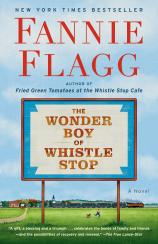The Wonder Boy of Whistle Stop
Review
The Wonder Boy of Whistle Stop
Every November, Mr. and Mrs. Hornbeck of Birmingham, Alabama, boarded the Crescent, which whisked them up to New York City for their yearly Christmas shopping trip. In 1938, as the train snaked its way through the small town of Whistle Stop, Alabama, Mrs. Hornbeck noticed a little blond boy waving and running alongside them. His sweet presence, however brief, made an impact on her, as she mentioned to her husband, “Arthur, I think that little boy back there had an arm missing.” She only saw him once, but on each ensuing trip, she would look for him and ponder, “I wonder whatever became of that cute little blond boy with the one arm.” Mrs. Hornbeck didn’t realize that she had seen the eponymous Wonder Boy of Whistle Stop.
So begins Fannie Flagg’s new novel, which takes readers back to the charming town and characters from her bestseller, FRIED GREEN TOMATOES AT THE WHISTLE STOP CAFÉ (and the subsequent movie, Fried Green Tomatoes).
"We all could use a dose of Whistle Stop kindness ourselves. That’s the thing about great storytellers: Like effective relief pitchers, they know just when they are most needed, and they deliver. Fannie Flagg should be in the Storytellers Hall of Fame."
In this latest outing, Flagg uses the character of Bud Threadgoode as the story’s epicenter. Bud, if you remember from FRIED GREEN TOMATOES, was the son of Ruth Bennett and the horrendous Frank Bennett; thankfully, he was raised by Ruth and his eccentric “Aunt” Idgie Threadgoode and her family in Whistle Stop. As a child, he spent most of his time in and around the Whistle Stop Café, which was run by his mother and Idgie. After an accident left Bud without an arm, Idgie was insistent that this would not stand in his way or make him different from the other children. She would remain a constant source of support in his life, especially after the death of his mother when he was a teenager.
The story goes back and forth in time, and we mostly see Bud as an older man, with children and grandchildren of his own. After retiring from his veterinary practice in Maryland, he moves to Atlanta to be closer to his only child, Ruthie, and her burgeoning family. After his wife, Peggy, passes away and Ruthie’s husband, Brooks, dies young from a heart attack, the two cling to each other, each wanting to help the other with their grief, with no mind paid to their own. This sweet selflessness of spirit is a hallmark of Flagg’s stories.
Another comforting feature of Flagg’s novels is the longing for days gone by, for simpler, gentler times. Missing the hometown of his youth, 84-year-old Bud decides to sneak out of his senior living center and board an Amtrak train headed for Birmingham, with plans to return to Whistle Stop. His visit becomes a distressing eye opener, as the Whistle Stop of his youth doesn’t exist anymore, save for a few abandoned buildings and faded road signs. What was supposed to be a nostalgic, clandestine trip quickly turns disastrous, ending up with Bud in the hospital. His senior center discovers he’s missing, and once they correctly communicate that to Ruthie (there’s a dark but comical scene where the staff informs Ruthie that her father is “gone,” which leads her to think the worst), a search for the wayward Bud begins in earnest.
The story even makes the local news, which Evelyn Couch is watching from her home just outside Birmingham. (The character of Evelyn got to utter the best line in FRIED GREEN TOMATOES, as two teens steal her parking space and she repeatedly drives into the back of their car, stating, “Face it girls, I’m older and I have more insurance.”) Evelyn recognizes Bud’s name from the report. Could he be related to Ninny Threadgoode, the lovely older woman she befriended at her mother-in-law’s nursing home? The one who told her the amazing story of Ruth and Idgie and the Whistle Stop Café? It must be! Evelyn decides to visit Bud at the hospital and see for herself. She owes a huge debt of gratitude to Ninny, who encouraged her to go into business for herself; she is now a super-successful businesswoman and a millionaire several times over. One good turn deserves another.
Weaving in and out of different time frames, with Bud as our lynchpin, we revisit our favorite characters from Flagg’s previous novels --- Ruth, Idgie, Sheriff Grady, Dot Weems --- and even get a cameo from the Oatman singers from STANDING IN THE RAINBOW. But you don’t need to have read the earlier books to enjoy THE WONDER BOY OF WHISTLE STOP. If anything, it will make you want to immediately go back and read the rest.
Much like the Marvel & DC Comics characters inhabit their own universes, you could say that Flagg has spent the last 40 years creating her own kinder, gentler universe. In her world, people are caring and neighborly; they gather at church while others sneak out to the gambling dens down by the river. They look out for their neighbors, celebrating their achievements as well as comforting them in times of trouble. This is in short supply right now as our country tries to reunite after a fractious election. No wonder Bud was pining for times gone by. We all could use a dose of Whistle Stop kindness ourselves. That’s the thing about great storytellers: Like effective relief pitchers, they know just when they are most needed, and they deliver. Fannie Flagg should be in the Storytellers Hall of Fame.
Reviewed by Bronwyn Miller on November 20, 2020
The Wonder Boy of Whistle Stop
- Publication Date: August 3, 2021
- Genres: Fiction, Women's Fiction
- Paperback: 304 pages
- Publisher: Random House Trade Paperbacks
- ISBN-10: 0593133862
- ISBN-13: 9780593133866




